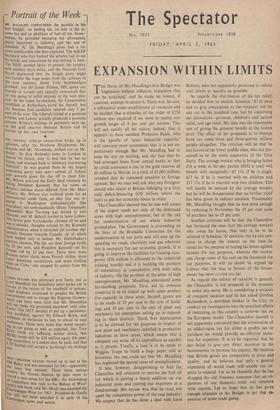EXPANSION WITHIN LIMITS
THE theme of Mr. Maudling's first Budget was 'expansion without inflation, expansion that can be sustained,' and he made an honest, if cautious, attempt to secure it. There was, he said, a substantial under-employment of resources and he decided that a stimulus of the order of £250 million was required if we were to realise our growth target of 4 per cent per annum. This will not satisfy all his critics; indeed, that it appears to have satisfied Professor Paish, who is the apostle of `spare industrial capacity,' will convince most economists that it is not ex- pansionary enough. But Mr. Maudling had to keep his eye on sterling, and the fact that he had arranged loans from central banks so that he could announce a rise in the gold reserves of £6 million in March, to a total of £1,005 million, revealed that he remained sensitive to foreign opinion. But we may well ask why any foreigner should take alarm at Britain indulging in a little mild deficit-financing (L90 million 'above the line') to put her economic house in order.
The Chancellor showed that he was well aware of the urgent needs not only of the distressed ateas with high unemployment, but of the call for modernisation of our whole industrial ground-plan. The Government is proceeding on the lines of the Rochdale Committee for the modernisation of our ports and will step up the spending on roads, electricity and gas wherever this is necessary for our economic growth. It is going to improve the facilities for training man- power (10 million is allocated to the industrial training boards) and it is tackling the problem of redundancy in consultation with both sides of industry. On the problem of the areas of high unemployment, Mr. Maudling announced some far-reaching proposals. First, aid to overseas countries is to be linked up with spare produc- tive capacity in these areas. Second, grants are to be made of 25 per cent to the cost of build- ings and 10 per cent to the cost of plant and machinery for enterprises setting up or expand- ing in these districts. Third, free depreciation is to be allowed for tax purposes in respect of new plant and machinery installed in productive industries in these areas, which means that a company can write off its expenditure as quickly as it pleases. Finally, a loan is to be made to Wiggins Teape to build a huge paper mill at Inverness. No one could say that Mr. Maudling has neglected the special areas of unemployment.
It was, however, disappointing to find the Chancellor still reluctant to remove the fuel oil tax which is putting a heavy addition on our industrial costs and putting our exporters at a disadvantage. His excuse was that he must not upset the competitive power of the coal industry. We suspect that he has done a deal with Lord Robens, who has apparently promised to reduce coal prices as quickly as possible.
As regards the distribution of his tax relief, he decided first to abolish Schedule 'A' at once and to give concessions to the taxpayer not by any cut in the standard rate, but by improving the allowances—personal, children's and earned relief, and age relief. His idea was the reasonable one of giving the greatest benefit at the lowest level. The effect of his proposals is to exempt from tax some three and three-quarter million people altogether. The criticism will be that he has favoured the lower middle class, who are pre- sumed to be the main supporters of the Tory Party. The average worker who is bringing home £16 a week in his pay packet (£832 a year) will benefit only marginally—£5 I Is. if he is single, £13 6s. if he is married with no children and £17 15s. if he is married with two children. This will hardly be noticed by the average worker, but he will be disappointed that no further relief has been given in indirect taxation. Presumably Mr. Maudling thought that he had done enough by reducing in November the 45 per cent scale of purchase tax to 25 per cent.
Another criticism will be that the Chancellor has favoured the man (not the average worker) who owns his house. Not only is he to be relieved of Schedule `A' taxation, but he can con- tinue to charge the interest on the loan he raised for the purpose of buying his house against income for tax purposes, whereas the worker can charge none of his rent on his leasehold for tax purposes. It will no doubt be argued by Labour that the bias in favour of the house- owner has been carried too far.
As regards the reform of taxation in general, the Chancellor is not prepared at the moment to make any move. He is considering a revision of company taxation and he has asked Gordon Richardson, a merchant banker in the City, to conduct an investigation into the practical effects of instituting in this country a turnover tax on the European model. The Chancellor himself is not apparently convinced that the substitution of an added-value tax for either a profits tax or purchase tax would provide an effective incen- tive for exporters. It is to be regretted that he has failed to give any direct incentive to the businessman to increase his exports. He believes that British goods are competitive in price and quality, and he believes that only a general expansion of world trade will enable our ex- ports to expand. Let us be thankful that he has dropped the old Treasury nonsense that an ex- pansion of our domestic trade will Interfere with exports. Let us hope that he has given enough stimulus in his Budget to get that ex- pansion of home trade going.


































 Previous page
Previous page